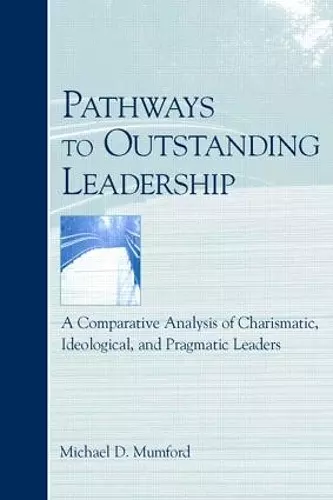Pathways to Outstanding Leadership
A Comparative Analysis of Charismatic, Ideological, and Pragmatic Leaders
Format:Paperback
Publisher:Taylor & Francis Inc
Published:22nd Mar '06
Currently unavailable, and unfortunately no date known when it will be back
This paperback is available in another edition too:
- Hardback£150.00(9780805851106)

The intent of this book is to provide a comprehensive comparison of charismatic, ideological, and pragmatic leadership. One hundred twenty leaders from government, military, business, religion, and politics are examined with respect to key leadership behaviors, including problem solving, leader–follower interactions, communications, politics, and integrity. Additionally, the implications of these paths for development and performance are examined. Most prior books on outstanding leadership have focused exclusively on vision-based leadership and have not focused on historically notable leaders and incidents of truly outstanding leadership. Case material from relevant biographies illustrate in concrete form the conclusions flowing from the various quantitative analyses. This is an important book for university and organizational courses on leadership.
"...the findings reported in this book will help identify the best institution-leader match on the basis of a clear understanding of the availability of three leader types - charismatic, ideological, and pragmatic - and the organizational and environmental conditions in which each type of leader thrives."
—PsycCRITIQUES
"Providing stimulating information, this book will appeal to those interested in leadership development in general and those interested in the particular institutions studied. An appendix lists the biographies used in the content analysis. Recommended."
—CHOICE
“The volume is extremely thorough. The authors present reasons to study ‘outstanding leadership’ and suggest a number of reasons why traditional leadership research has shied away from studying extreme cases of historical leadership. This apparent gap in the literature is one in which the current volume stands to make a measurable contribution in addressing. The book fills an important niche and is likely to generate quite a bit of interest from the leadership research community.”
—Michelle C. Bligh
School of Behavioral and Organizational Sciences, Claremont Graduate University
“Mumford's book contributes significantly to the literature by articulating in fine conceptual manner the distinctions among different forms of outstanding leadership and providing a framework for thinking about and researching these different pathways.”
—Stephen Zaccaro
Department of Psychology, George Mason University
"...the findings reported in this book will help identify the best institution-leader match on the basis of a clear understanding of the availability of three leader types - charismatic, ideological, and pragmatic - and the organizational and environmental conditions in which each type of leader thrives."
—PsycCRITIQUES
"Providing stimulating information, this book will appeal to those interested in leadership development in general and those interested in the particular institutions studied. An appendix lists the biographies used in the content analysis. Recommended."
—CHOICE
“The volume is extremely thorough. The authors present reasons to study ‘outstanding leadership’ and suggest a number of reasons why traditional leadership research has shied away from studying extreme cases of historical leadership. This apparent gap in the literature is one in which the current volume stands to make a measurable contribution in addressing. The book fills an important niche and is likely to generate quite a bit of interest from the leadership research community.”
—Michelle C. Bligh
School of Behavioral and Organizational Sciences, Claremont Graduate University
“Mumford's book contributes significantly to the literature by articulating in fine conceptual manner the distinctions among different forms of outstanding leadership and providing a framework for thinking about and researching these different pathways.”
—Stephen Zaccaro
Department of Psychology, George Mason University
ISBN: 9780805851113
Dimensions: unknown
Weight: 453g
312 pages